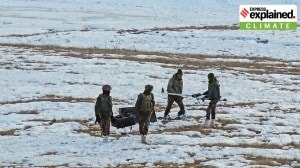Fire and ice
THE safe conduct of the month-long Amarnath yatra, which begins in mid-July every year, has become something of an acid test of our security...

THE safe conduct of the month-long Amarnath yatra, which begins in mid-July every year, has become something of an acid test of our security preparedness, not just in terms of the yatra itself but of J038;K as a whole. This is not only because of the huge numbers involved 8212; some 6,000 pilgrims on an average make their way to the Amarnath shrine high up in the mountains of the Lidder valley 8212; but because the pilgrimage route passes through the mountainous regions of Doda and Anantnag, which have traditionally been the hunting ground of militants. There is, besides, the unhappy history of hardships that pilgrims on this route in the past have endured, whether they were caused by natural calamities like landslides or through terrorist violence.
Tuesday8217;s grenade attack in Laizbal, Anantnag, on a taxi carrying pilgrims, may not have caused a large number of casualties, but it nevertheless underlined how even the cordon sanitaire along the route, comprising the army, the CRPF and the armed police, is no guarantee of a fail-proof security system. The ill-fated taxi had just happened to have slowed down while negotiating a speed-breaker, indicating that some preparation had gone into identifying the spot and preparing for the strike. Railing against the cowards who thought up this diabolic plan is pointless. Terrorists in Kashmir have long proved that they have lost any shred of humanity and will think nothing of attacking soft targets, unarmed men and women whose only reason for undertaking this arduous journey is their faith. Any civilised entity would term such action as unacceptable and abhorrent, but the enemy here does not understand the meaning of the word and one would have to take it as a given that terrorists will continue to target the yatra.
The point, of course, is to ensure that the stratagem is effectively foiled and the message sent that it can never succeed. Farooq Abdullah believes that, despite the state leaving no stone unturned in terms of ensuring security cover for the pilgrims, 8216;misfortunes cannot be ruled out8217;. Given that any attack on Amarnath pilgrims has the potential of turning the tense situation in the state into an ugly situation with wider ramifications; given the fact that it has the potential of destabilising the important election process in J038;K, the state government must ensure that such 8216;misfortunes8217; are indeed ruled out, even if it means mobilising many more men, ammunition, possibly even aircraft, along the route. For the pilgrims, visiting the Shivlingam in the cave is an act of faith. Securing their lives intelligently cannot be one.
- 01
- 02
- 03
- 04
- 05































